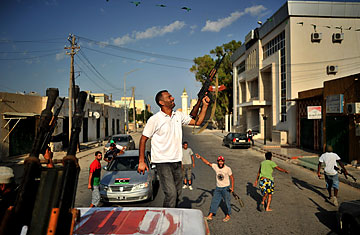
A Libyan rebel celebrates after rebel forces defeated loyalist troops in Al-Jamil, western Libya, on August 27, 2011.
"What is a constitution?" Zubaida Ben Taher asked a group of curious Libyans gathered in a lecture hall at Benghazi's Garyounis University in early April. Though the writer's talk was ostensibly about the electoral process, he had to begin with the bare basics when addressing an audience that had almost no knowledge of what democracy entails. In early June another lecture on the same topic began with a discussion on various political systems such as democracies, communist regimes and Third World dictatorships. With no experience with elections, Libyans are compelled to begin their transition towards democracy by starting with its fundamentals. As a result, their march towards democracy has been a slow one and they are ill prepared for the elections their leaders have announced will be held in eight months.
"It's difficult to teach a people who were oppressed for so long about the political systems that prevail throughout the world," says Abd al-Salam al-Mismari, who leads the February 17th coalition, a group of lawyers and civil society activists in Benghazi. "[Former Libyan leader Muammar] Gaddafi destroyed the most basic state institutions. It will be difficult to build them from scratch."
It is not only the obstacles Gaddafi erected that are impeding the transition towards democracy. Activists were reluctant to form political parties while rebels were still fighting his forces on the battlefield. "We could not be seen as moving too quickly," explains Farqus Abu Zayd, a lawyer who has been behind the push to educate parts of eastern Libya to demand more from their leaders. They were equally worried that if they moved too fast, residents of western Libya, which remained under Qaddafi's control until the fall of Tripoli last week, would resent easterners for dominating the burgeoning political process.
Fears of getting ahead of the revolution only partly explain the slow move towards democracy. Libyans have long been wary of politics. In 1977, Gaddafi announced that the citizens of Libya would rule the country through a hierarchy of elected committees. Local bodies would elect a larger country-wide congress that would wield power. But few ever understood his byzantine system and none really believed the masses had any control as the Libyan leader consistently boasted. "Gaddafi's system was so convoluted and it confused everyone," says Garyunis Political Science Professor Salah al-Sanussi. "Now a lot of people don't have faith in a new system like democracy that promises they will truly rule."
Despite these challenges, Ibrahim al-Ghiryani decided that the end of Gaddafi's rule in the east was propitious for establishing a political party. On June 7, he announced the creation of the Justice and Constitution party, the first political party in Libya since Gaddafi disbanded the Arab Socialist Union in the mid-1970's. "There was a real concern that people might get upset and see the [the anti-regime political council] National Transitional Council as permanent," said the lawyer in his spacious Benghazi office. "This is why we decided to break the ice and show that the revolution is for a move to democracy and not just for ridding the country of Gaddafi." Though al-Ghiryani was the first to breach the wall Gaddafi had erected against political organizing, not many were prepared to follow him. Since then, only one other party has been formed.
Instead of focusing on establishing political parties, activists in the East are concentrating on writing a new constitution. They have been busy running workshops like the one Ben Taher addressed in April. Benghazi bookshops are full of the pamphlets containing the constitution that prevailed under the Sanussi monarchy Gaddafi overthrew in 1969. Since then, the country has been without one and attempts to reinstate a political charter have floundered. When Gaddafi's son Saif al-Islam drafted a new one in 2008, his father's hardline cronies blocked it. "People here looked at the problems Libya faces [and] either focus on politics or try to establish a structural framework," noted Garyunis Constitutional Law Professor Abd al-Qadir Qadura. "They decided the latter was more important and chose to focus on writing a new constitution. As a result, political parties and elections suffered."
The NTC, the rebels' ruling body, does not appear ready for the transition to democracy which it has promised since the early days of the revolution. In March, its leader Mustafa Abd al-Jalil said elections would be held within six months of Gaddafi's fall. But last week, he revised his forecast, saying the council needed eight months. The NTC chairman's March announcement also noted that council's members will not stand in future elections, meaning the people who have managed the rebels' affairs since February intend to step aside to make room for activists who have no political experience.
"Abd al-Jalil's statement was intended to show Libyans that they have a chance to rule Libya and to reduce fears in the West that Easterners would monopolize power once Gaddafi was gone," explained Professor al-Sanussi. "But his announcement backfired. Now who will lead Libya once the NTC dissolves itself?"
NTC leaders however are optimistic the democratic transition will be smooth. "We can do this. We just need some time" states council member Ali Kalam. But with elections eight months away and only two political parties formed, time is a commodity in short supply.
